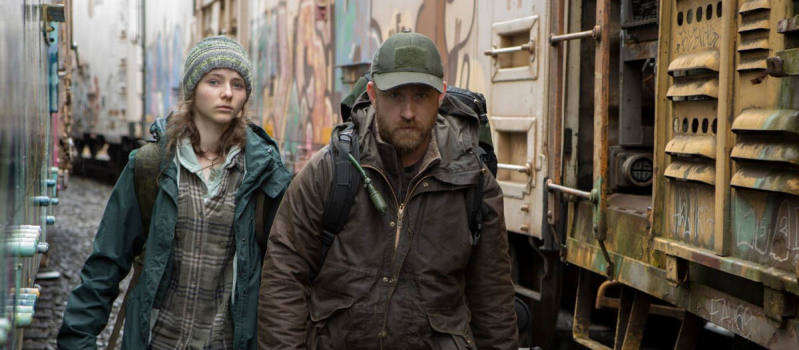Named for the first law of conservation, the title of Debra Granik’s latest perfectly evokes the film’s mood of quiet sublimation.
Father and daughter Will (Ben Foster) and Tom (Thomasin McKenzie) subsist illegally out in the primeval wilds of Forest Park near Portland, Oregon in a makeshift camp perfectly concealed behind the mossy bulk of a fallen tree. Their daily routine consists of basic survivalism –foraging for edible plants, collecting rainwater, practising hiding their tracks – punctuated with understated appreciation and the occasional compliment.
Both Will and Tom seem content, though their situation is not quite idyllic: wolves are heard howling around their tent at night and Tom, a lanky adolescent, is usually hungry. The only time they venture into civilisation is to pick up the necessary supplies and check in with the VA – Will, it goes almost without saying, has seen some form of combat.
However, a seemingly minor incident upturns their lives, forcing them to reintegrate back into the world from which they’ve distanced themselves.
Based on a book inspired by a real-life case, Leave No Trace delicately probes what it means to be a part of society; how our lives are benignly colonised by a house, a job, acquaintances; how they slowly get inside us. “At least we have our thoughts,” says Tom, increasingly half-heartedly as her attention is diverted by church activities, by the prospect of a life beyond.
Tom, though, is beyond reintegration. He’s never at ease unless he’s out amid the trees, away from people – apart from Tom. Only there he can be himself; fair-minded and assured, though no less soft-spoken.
Granik’s previous films (Down To The Bone, Winter’s Bone) have been about people failing to live up to society’s expectations. Avoiding the usual cliches in portraying PTSD, Leave No Trace is careful to only hint at Will’s condition – his discomfort during car rides, or awaking abruptly at night to the sound of imagined helicopter blades. The people he encounters, however well-meaning, can’t seem to help him. No matter what is asked of him and what is offered, it’s not enough. All Will wants is the freedom to be free.
Unlike Captain Fantastic, which documented a similarly unorthodox upbringing, but looks smug and self-aggrandizing in retrospect, Leave No Trace is more akin to Manchester By The Sea: a portrait of brokenness (though without that film’s innate despair).
Compellingly low-key and naturalistic, the film lacks the high emotional register, perhaps, to gain much traction with the major awards bodies; though it’s likely to be a staple of most critic’s top ten lists. There are few tears, no yelling or histrionics. Then again, perhaps that’s only appropriate: it’s hard to imagine Will as a character being less comfortable than amid the glitz and glamour and back-slapping of a Hollywood awards ceremony.
It’s testament to Foster here that, despite a career of standout performances in the likes of The Program and Hell Or High Water, I am utterly unable to separate him from the character of Will. Quiet and cautious, any social interaction is met with a mumble and a grimace, as though basic human contact rubs at him.
Even more impressively, newcomer McKenzie matches him beat for beat. Wary-eyed, hyper-alert, almost bird-like, all she wants is to return to her father’s side, regardless of his compulsion.
Over the course of the film, our viewpoint shifts, oh so subtly, as Tom begins wanting things beyond that which Will’s ideology allows for. This first seems like manipulation, a tragedy even, but over time, as Will’s behaviour becomes increasingly reckless and irrational, we come to appreciate how unintentionally selfish his behaviour is. Tom isn’t broken, just conditioned, and perhaps this isn’t a price she’s willing to pay.
Leave No Trace is all the more powerful in its subtlety, with a low-key emotionality that marks it as indelible. Days later I’m still thinking about it.
